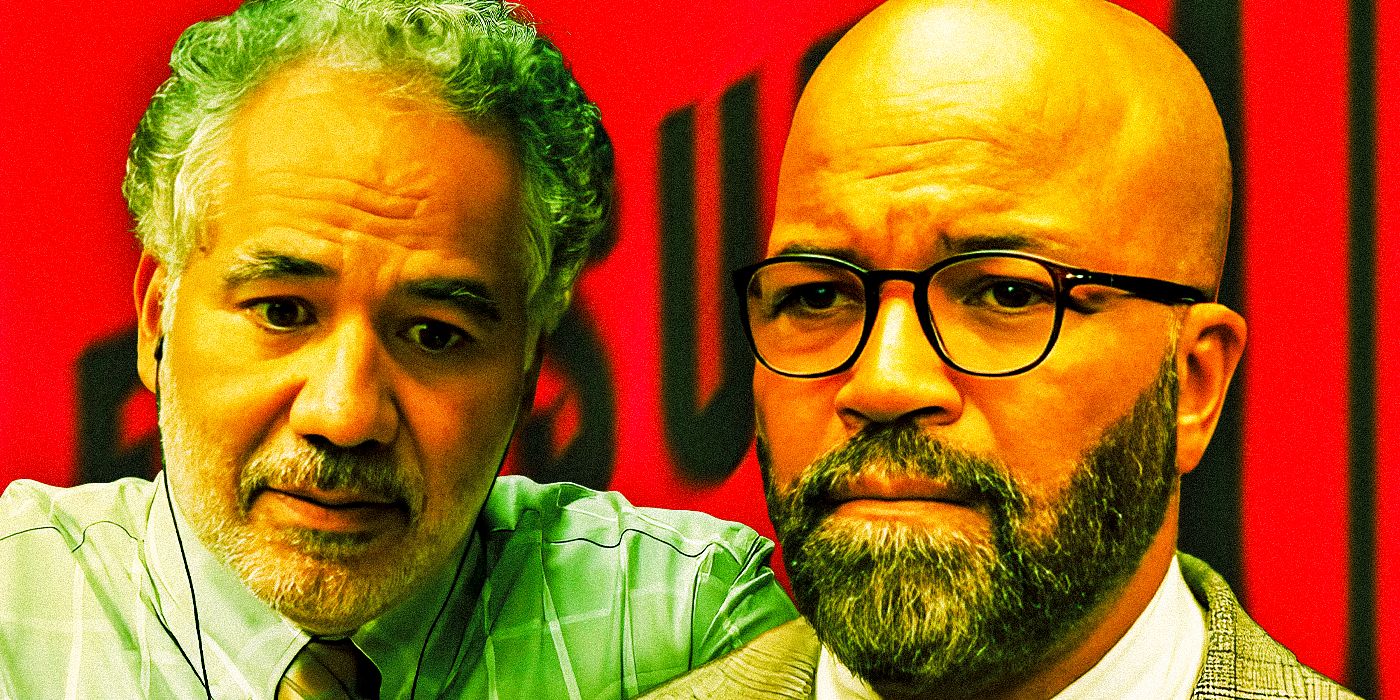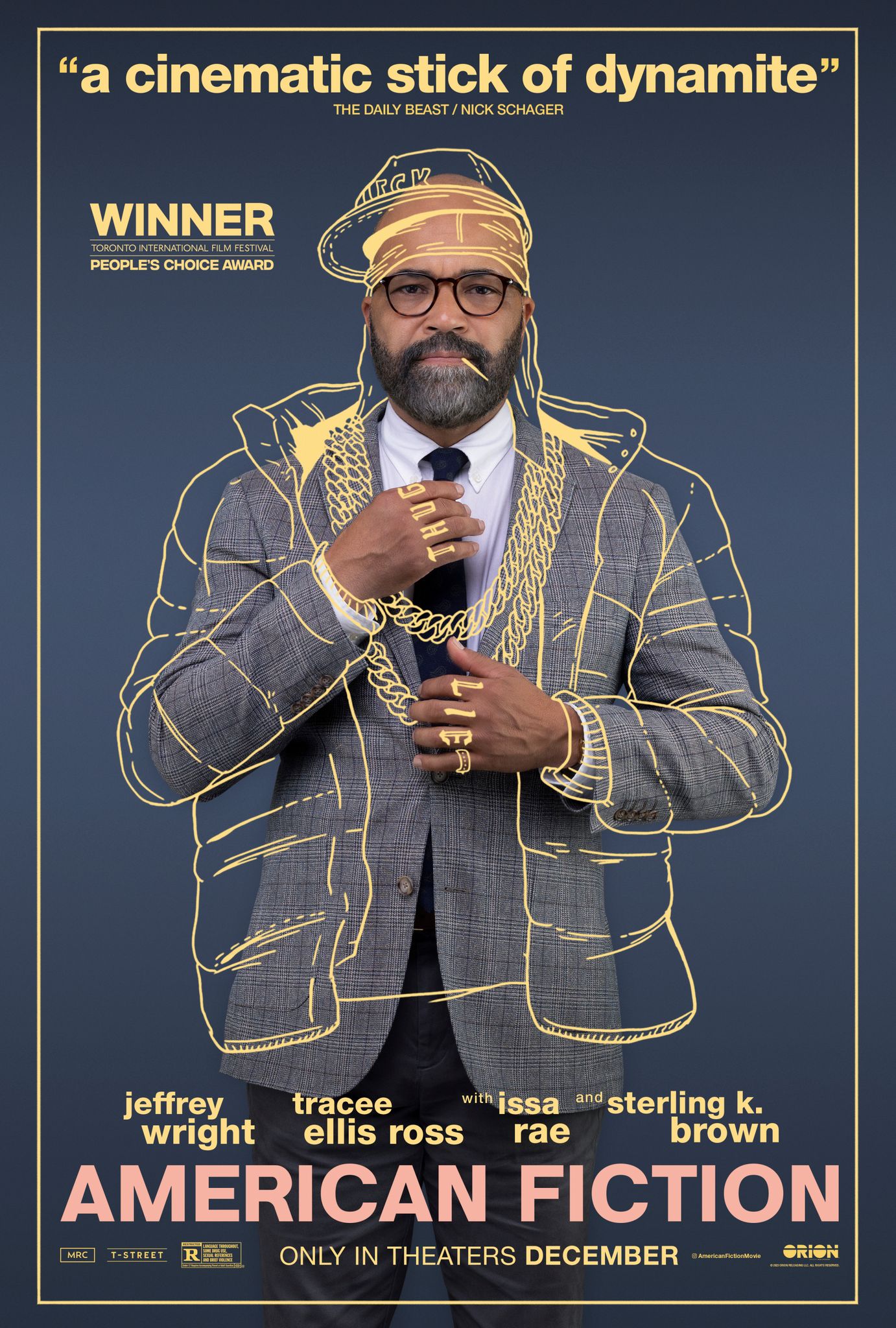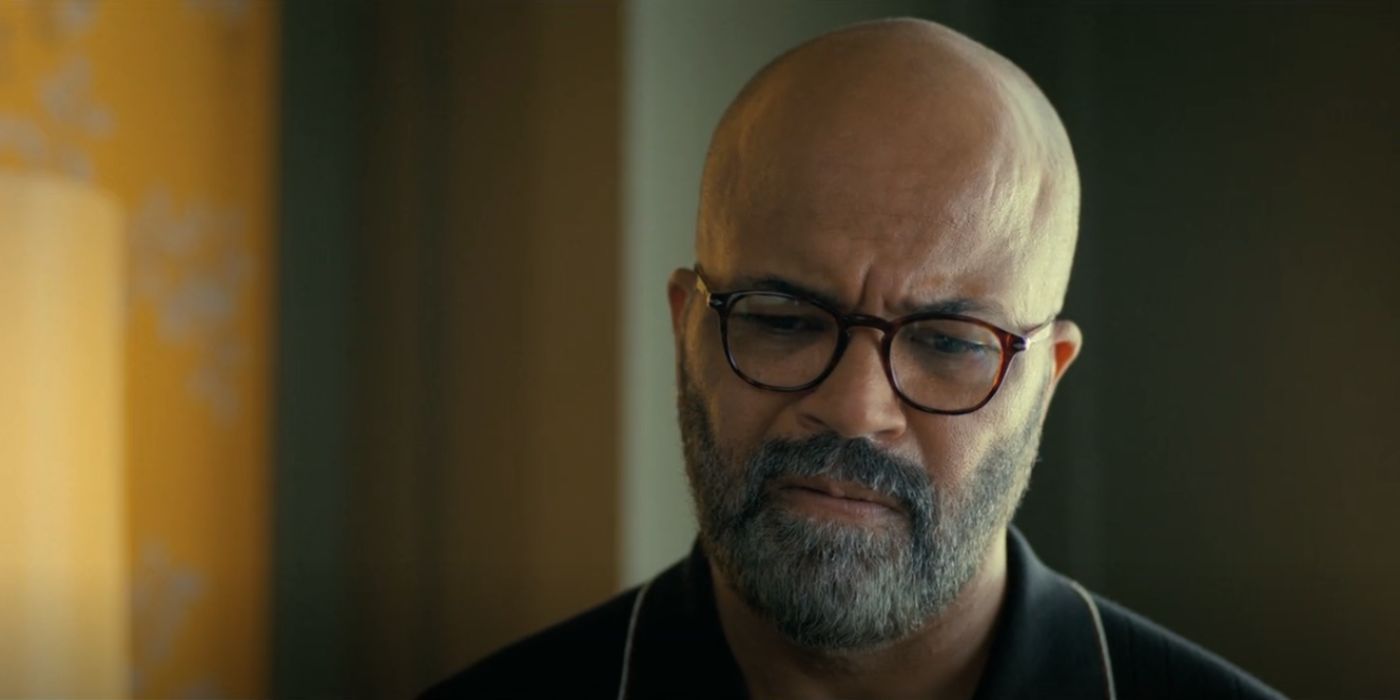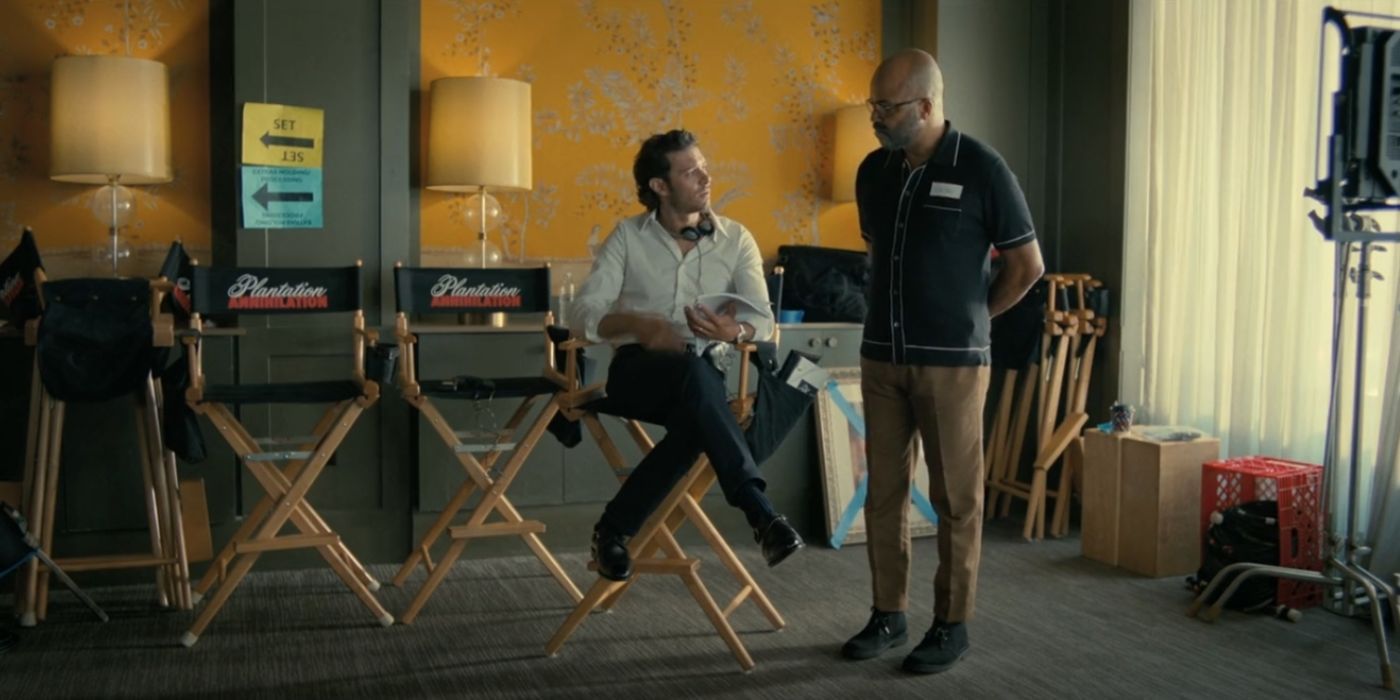Summary
- American Fiction delivers a nuanced take on race in literature, testing audiences with meta-commentary and satirical twists.
- The film's multiple endings reveal a complex examination of societal expectations and media sensationalism.
- Monk's journey in American Fiction challenges perceptions of art and entertainment, emphasizing the need for connection.
American Fiction, the latest film starring Jeffrey Wright, delivers a fantastic, thought-provoking ending with plenty of ambiguity and thematic depth to break down. The film is American writer Cord Jefferson's directorial debut, based on the novel Erasure by Percival Everett. American Fiction delivers a nuanced, often satirical commentary on media, literature, and the perception of the work of Black artists. The film has been nominated for five Academy Awards, including Best Actor for Jeffrey Wright, Best Supporting Actor for Sterling K. Brown, and Best Picture.
Jeffrey Wright leads the American Fiction cast as Thelonious "Monk" Ellison, an intelligent author and professor who's written acclaimed novels without commercial success. After his publishers reject his latest novel for not being "Black enough," he notices the success of author Sintara Golden, whose novel We's Lives in Da Ghetto has become a phenomenon by pandering to Black stereotypes. Amidst family struggles and a budding new relationship, Monk sets out to emulate Golden's pandering by writing his own novel under the guise of an alternative persona, an escaped convict named "Stagg R. Leigh," fulfilling clichés like gang violence and drugs.
American Fiction's Multiple Endings Explained
American Fiction cuts to black before revealing alternative endings.
American Fiction is a complex but relatively straightforward film. That is, up until the end. At a certain point, Monk seems to be in over his head, living his real life and also embodying the Stagg persona to promote his book, which he perceives as schlock. He writes the novel out of spite, mocking authors like Sintara Golden, but ultimately profits greatly and even wins an award. As he shockingly gets up to receive his award, revealing to the crowd that Monk and Stagg are the same person, he announces that he has a confession before the screen quickly cuts to black.
Suddenly, Monk is on a movie set, working with a producer named Wiley (Adam Brody) to figure out how to end their film, which real American Fiction audiences are to understand is the movie they've been watching up until this point. Monk has just suggested the "cut to black" idea, but Wiley believes the ambiguity won't bring audiences to the theaters, suggesting they work out some straightforward alternatives. Monk suggests ending the story romantically with the fictional version of himself returning to Coraline to apologize. Wiley isn't a fan of the idea, suggesting it's too close to a romantic comedy.
Monk is frustrated by the exploitation of the idea, but Wiley loves it and decides it's the film's proper ending.
Monk then suggests another idea, where his fictional self would go up on the stage to receive the award for Stagg, revealing himself to be the author. Expecting Stagg, a wanted fugitive, to show up and collect the award, police would then barge in to arrest him. The police would then misinterpret Stagg's award for having a gun in his hand and shoot him down at the ceremony. Monk is frustrated by the exploitation of the idea, but Wiley loves it and decides it's the film's proper ending.

American Fiction's 9 Biggest Book Changes
The 2023 comedy film American Fiction brilliantly examines race in relation to creative writing. However, the film makes several changes to the book.
How American Fiction's Ending Changes The Entire Movie
American Fiction reveals itself to be a movie within a movie, which holds meaning for everything that came before.
The ending of American Fiction has dramatic consequences for the story up until this point. The film Monk and Wiley are making is a fictionalized version of events that actually happened to the former, where he was fed up with the state of Black literature and decided to write a satirical novel to get back at the industry. American Fiction already had layers of meta-commentary before its ending, but the final layer implies that Monk has grown to understand the needs of a commercial audience and has sold his story to Hollywood to secure himself financially.
The film as a whole is self-aware and tests the audience with questions about their perception of movies and how they can be emotionally manipulated by sensationalism.
American Fiction, being a movie within a movie, raises several questions for the story, specifically the ambiguity regarding what actually happened and what was just part of Monk's script. While the film may have seemed natural before this point, the ending denotes it as pandering to expectations: witty one-liners, absurdly campy film producers, and a slew of dramatic family problems. Much like the books Monk hates, American Fiction panders. However, the film as a whole is self-aware and tests the audience with questions about their perception of movies and how they can be emotionally manipulated by sensationalism.

10 Best Movies Like American Fiction
While American Fiction's themes of remaining true to oneself are well-written, there are other movies with similar subjects that are just as good.
The Importance Of Monk's Movie's Ending
Monk has sold his story to Hollywood, which has specific meaning for his character.
The ending of Monk's movie, where his fictional self is shot to death on stage, reflects directly on the clichés he hoped to satirize with his novel. Even though Monk and Wiley's movie seems to be a self-reflective examination of those clichés, Wiley doesn't understand that or care but realizes that a brutal, tragic ending will have a commercial appeal. Monk hates the ending, as it strips away the authenticity to pander to audiences. Just like the original book he tried to publish, his movie won't be seen as a "Black story" unless it has a sensationalized conclusion.
Do Coraline & Monk Get Back Together?
Monk damaged his relationship with Coraline earlier in the film.
After Monk catches Coraline reading the Stagg novel, he berates her for saying she enjoys it, demonstrating an inability to connect with others that has plagued his family life and relationships for years. Coraline is notably upset, telling him to leave. In Monk's movie, he texts her to apologize, inviting her to the award ceremony, which she arrives for. However, when discussing the chance of a romantic ending for the movie with Wiley, the real Monk reveals that she hasn't responded to his texts. Anything is possible, but Monk and Coraline don't seem to be getting back together.
What Cord Jefferson & Jeffrey Wright Have Said About American Fiction's Ending
American Fiction's director and star have commented on its meaning.
Director Cord Jefferson had interesting thoughts regarding the film and offered his interpretations. Jefferson explains Monk's perspective, saying, "He's on his high horse and just like, 'You guys are doing it wrong.'" (via Refinery29) He adds, explaining Monk's growth: "He finally understands that like, 'Oh, being mad at these people on the ground with me is ridiculous." In fact, these people are operating within a system at an institution that has existed far before any of us." From his perspective, the American Fiction ending is about Monk realizing he has to participate in the system rather than judge it.
In an interview with USA Today, Star Jeffrey Wright adds that he believes Monk is doing "what you need to do in order to live a creative life." He adds, referring to a short moment at the end when Monk nods to an actor dressed in a slave costume on set, "This is what people are offering you, and it doesn't demean you or diminish your abilities. So Monk giving him a wave and a head nod is like, 'I see it.' It's finally his connection with the rest of the world."

Where To Watch American Fiction: Showtimes & Streaming Status
American Fiction has been nominated for five Oscars, and with many movie fans now wanting to watch the film, here's where you can find it.
The Real Meaning Of American Fiction
Breaking down American Fiction's themes and central character arc.
Ultimately, American Fiction is a satirical critique of America's generalizations of race in film and literature. The film explores these issues but still honors the Black artists who partake in what Monk would view as pandering, acknowledging that they're doing what they must to make art. American Fiction also makes playful jabs at its audience for their participation in the grander media system, consuming entertainment that would frustrate Monk.
As for Monk as a character in American Fiction, he represents the type of story he'd like to see written. He's a Black man in America with his own set of problems, mostly about his family, but they're not anything like the problems portrayed in the fictional novels he hates. Monk is so consumed by his anger toward popular culture that he struggles to relate to his family, friends, and students, often choosing to live in his isolation. Monk's journey is about him understanding the importance of entertainment and how what he perceives as shlock can help people connect.
American Fiction is a brilliant film and one of Jeffrey Wright's best movies and performances. Layers of questions and thematic depth force the viewer to question their own relationship with art and media, with twists constantly keeping them on their toes. Even audiences that feel more refined and perceptive than the hypothetical book readers in American Fiction may be questioning themselves at the end.
Sources: Refinery29, USA Today

American Fiction
Based on the novel by Percival Everett, American Fiction is a drama film that stars Jeffrey Wright as author and English Professor Thelonious "Monk" Ellison. With his students lacking cultural sensitivity and publishers rejecting his novels, believing them not to be "Black enough," Monk returns to his hometown where he witnesses a new young Black author who has created an instant best seller. As he attempts to ignore the success of another, he reunites with his family, where tragedy and chaos begin to consume them.
- Director
- Cord Jefferson
- Release Date
- September 8, 2023
- Cast
- Jeffrey Wright , Tracee Ellis Ross , John Ortiz , erika alexander , Leslie Uggams , Adam Brody , Keith David , Issa Rae , Sterling K. Brown
- Runtime
- 117 Minutes







